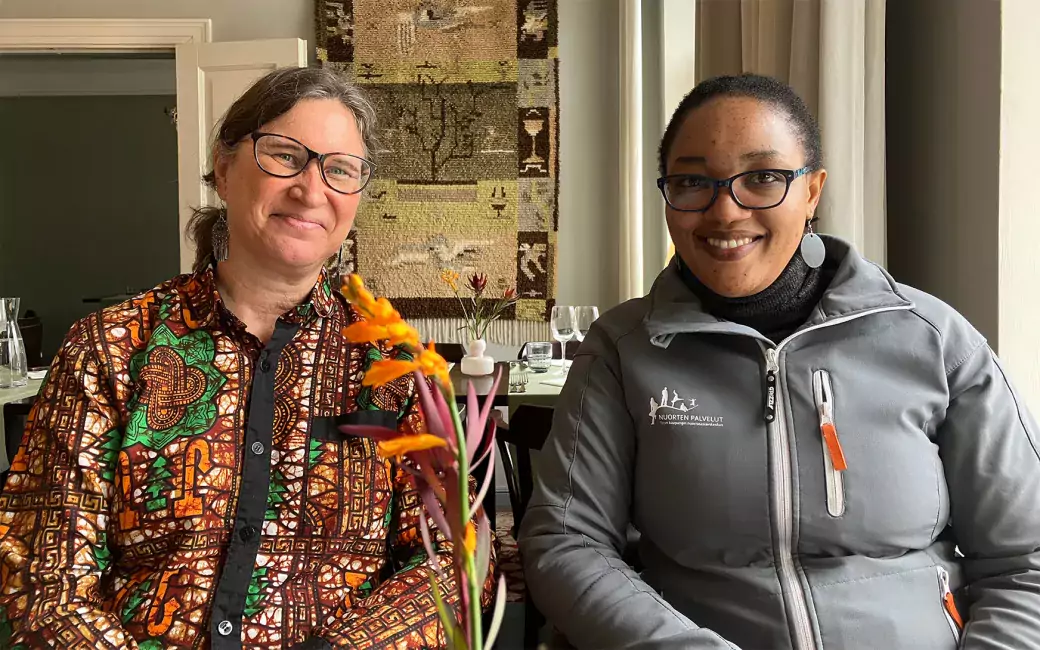Clementine Nishimwe is visiting the Faculty of Theology, where she works with Professor Auli Vähäkangas. Nishimwe and Vähäkangas are investigating immigration and the ways in which religious communities can welcome refugees to a new country.

"I use an ethnographic theological approach to research, specialising in migration and Christianity in conversation with African women's theologies. My approach and research draw on gender perspectives," notes Clementine Nishimwe.
Discussion on refugees and the acceptance of differences is particularly important in Finland right now. The racism controversy that hit the country this summer demonstrated that society as a whole must be involved in accepting diversity and taking a stand.
"We concentrate on how religious communities can support refugees. It's one way in which civil society can support people arriving in Finland - mentally, spiritually and materially," says Auli Vähäkangas, adding: "Nishimwe has a great deal to contribute."
"During her stay in Finland, we will be co-authoring an article based on a dataset collected by the Church Research Institute from Finnish church employees, of whom about 90% were Evangelical Lutherans, using a questionnaire in late 2022 and early 2023," Vähäkangas explains.
The article will utilise Nishimwe's research expertise and her experiences as a young migrant from Rwanda who lives in South Africa since 2007.
The Africa Early Career Mobility Programme which Nishimwe is now participating also involves work in the visiting scholar's home country the year after their stay in Finland. Consequently, Vähäkangas will travel to Johannesburg for a month in spring 2024 to continue the writing process using data from a project funded by the South African National Research Foundation (NRF).
Nishimwe will participate as a researcher in this project, exploring local religious communities and how in their operations they can engage refugees and welcome them to South African society.
"Both of the articles we're working on discuss the concept of egalitarianism, the pursuit and promotion of equality. Its opposite is inequality, but in these publications we will also discuss racism and xenophobia, or the negative emotions and practices associated with egalitarianism," says Vähäkangas
Helsinki through the eyes of a visiting scholar
"A peaceful walk in Helsinki reminds me of my childhood in Rwanda, when I could walk to comprehensive and upper secondary school in a peaceful environment. Such tranquil moments are rare in many parts of the world," notes Nishimwe.
She is staying in Finland with her school-age daughters Amy and Amelia and hoping to make contacts with fellow researchers with similar research interests. She is also enthusiastic about getting acquainted with Finnish culture, values and religions, particularly diaspora churches and communities.
During her current stay, Nishimwe is actively involved in a research project that explores how egalitarianism and other religious values are embodied by churches that welcome Ukrainian migrants focusing on the religious value that churches represent to immigrants from Ukraine.
"I have the opportunity to pursue my research goals by visiting several churches in Helsinki to obtain information on the religious landscape here and on lived experiences of religious values in the community."
Nishimwe says that the reinforcement of academic skills and research capabilities complies with the UN's Sustainable Development Goals.
"My research is associated with, in particular, Goal 5 (Gender equality), Goal 10 (Reduced inequality) and Goal 16 (Peace, justice and strong institutions)."
Nishimwe is using an ethnographic theological approach and a gender perspective focused on African migrant women's theologies to reinforce their own voices while promoting gender equality and reducing inequality in religious and academic contexts.
"In addition, I investigate experiences of migration and promote Goal 10 by shedding light on marginalised migrant communities."
She supports Goal 16 by exploring religious values in conflict communities, such as xenophobia in Johannesburg, aiming to explore religious values that could promote peace, interreligious dialogue, and mediation.
"To conclude, I'd like to note that my dedication to South African liberation theologies and especially the perspectives of African women emphasises my commitment to social justice, equality and the reinforcement of institutions for the purpose of positive change, all of which supports several SDGs collectively."
Clementine Nishimwe is highly interested in collaboration and aims to continuously expand her knowledge of teaching and learning.
"I'm also open to examining potential opportunities for research collaboration that can benefit postgraduate students at both our universities," she says.
Open whole box






